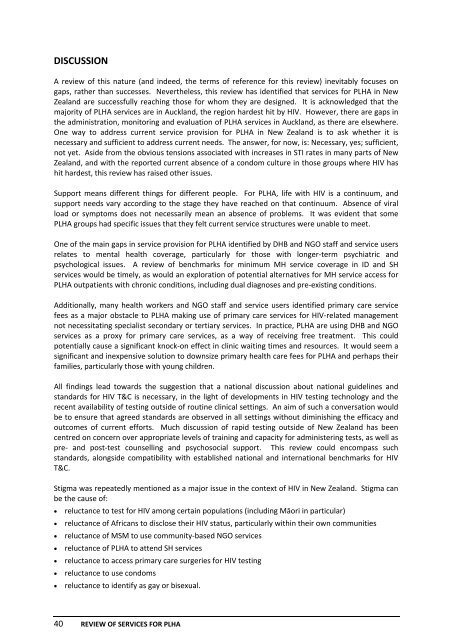Review of services for people living with HIV in New Zealand
Review of services for people living with HIV in New Zealand
Review of services for people living with HIV in New Zealand
- No tags were found...
Create successful ePaper yourself
Turn your PDF publications into a flip-book with our unique Google optimized e-Paper software.
DISCUSSIONA review <strong>of</strong> this nature (and <strong>in</strong>deed, the terms <strong>of</strong> reference <strong>for</strong> this review) <strong>in</strong>evitably focuses ongaps, rather than successes. Nevertheless, this review has identified that <strong>services</strong> <strong>for</strong> PLHA <strong>in</strong> <strong>New</strong><strong>Zealand</strong> are successfully reach<strong>in</strong>g those <strong>for</strong> whom they are designed. It is acknowledged that themajority <strong>of</strong> PLHA <strong>services</strong> are <strong>in</strong> Auckland, the region hardest hit by <strong>HIV</strong>. However, there are gaps <strong>in</strong>the adm<strong>in</strong>istration, monitor<strong>in</strong>g and evaluation <strong>of</strong> PLHA <strong>services</strong> <strong>in</strong> Auckland, as there are elsewhere.One way to address current service provision <strong>for</strong> PLHA <strong>in</strong> <strong>New</strong> <strong>Zealand</strong> is to ask whether it isnecessary and sufficient to address current needs. The answer, <strong>for</strong> now, is: Necessary, yes; sufficient,not yet. Aside from the obvious tensions associated <strong>with</strong> <strong>in</strong>creases <strong>in</strong> STI rates <strong>in</strong> many parts <strong>of</strong> <strong>New</strong><strong>Zealand</strong>, and <strong>with</strong> the reported current absence <strong>of</strong> a condom culture <strong>in</strong> those groups where <strong>HIV</strong> hashit hardest, this review has raised other issues.Support means different th<strong>in</strong>gs <strong>for</strong> different <strong>people</strong>. For PLHA, life <strong>with</strong> <strong>HIV</strong> is a cont<strong>in</strong>uum, andsupport needs vary accord<strong>in</strong>g to the stage they have reached on that cont<strong>in</strong>uum. Absence <strong>of</strong> viralload or symptoms does not necessarily mean an absence <strong>of</strong> problems. It was evident that somePLHA groups had specific issues that they felt current service structures were unable to meet.One <strong>of</strong> the ma<strong>in</strong> gaps <strong>in</strong> service provision <strong>for</strong> PLHA identified by DHB and NGO staff and service usersrelates to mental health coverage, particularly <strong>for</strong> those <strong>with</strong> longer‐term psychiatric andpsychological issues. A review <strong>of</strong> benchmarks <strong>for</strong> m<strong>in</strong>imum MH service coverage <strong>in</strong> ID and SH<strong>services</strong> would be timely, as would an exploration <strong>of</strong> potential alternatives <strong>for</strong> MH service access <strong>for</strong>PLHA outpatients <strong>with</strong> chronic conditions, <strong>in</strong>clud<strong>in</strong>g dual diagnoses and pre‐exist<strong>in</strong>g conditions.Additionally, many health workers and NGO staff and service users identified primary care servicefees as a major obstacle to PLHA mak<strong>in</strong>g use <strong>of</strong> primary care <strong>services</strong> <strong>for</strong> <strong>HIV</strong>‐related managementnot necessitat<strong>in</strong>g specialist secondary or tertiary <strong>services</strong>. In practice, PLHA are us<strong>in</strong>g DHB and NGO<strong>services</strong> as a proxy <strong>for</strong> primary care <strong>services</strong>, as a way <strong>of</strong> receiv<strong>in</strong>g free treatment. This couldpotentially cause a significant knock‐on effect <strong>in</strong> cl<strong>in</strong>ic wait<strong>in</strong>g times and resources. It would seem asignificant and <strong>in</strong>expensive solution to downsize primary health care fees <strong>for</strong> PLHA and perhaps theirfamilies, particularly those <strong>with</strong> young children.All f<strong>in</strong>d<strong>in</strong>gs lead towards the suggestion that a national discussion about national guidel<strong>in</strong>es andstandards <strong>for</strong> <strong>HIV</strong> T&C is necessary, <strong>in</strong> the light <strong>of</strong> developments <strong>in</strong> <strong>HIV</strong> test<strong>in</strong>g technology and therecent availability <strong>of</strong> test<strong>in</strong>g outside <strong>of</strong> rout<strong>in</strong>e cl<strong>in</strong>ical sett<strong>in</strong>gs. An aim <strong>of</strong> such a conversation wouldbe to ensure that agreed standards are observed <strong>in</strong> all sett<strong>in</strong>gs <strong>with</strong>out dim<strong>in</strong>ish<strong>in</strong>g the efficacy andoutcomes <strong>of</strong> current ef<strong>for</strong>ts. Much discussion <strong>of</strong> rapid test<strong>in</strong>g outside <strong>of</strong> <strong>New</strong> <strong>Zealand</strong> has beencentred on concern over appropriate levels <strong>of</strong> tra<strong>in</strong><strong>in</strong>g and capacity <strong>for</strong> adm<strong>in</strong>ister<strong>in</strong>g tests, as well aspre‐ and post‐test counsell<strong>in</strong>g and psychosocial support. This review could encompass suchstandards, alongside compatibility <strong>with</strong> established national and <strong>in</strong>ternational benchmarks <strong>for</strong> <strong>HIV</strong>T&C.Stigma was repeatedly mentioned as a major issue <strong>in</strong> the context <strong>of</strong> <strong>HIV</strong> <strong>in</strong> <strong>New</strong> <strong>Zealand</strong>. Stigma canbe the cause <strong>of</strong>: reluctance to test <strong>for</strong> <strong>HIV</strong> among certa<strong>in</strong> populations (<strong>in</strong>clud<strong>in</strong>g Māori <strong>in</strong> particular) reluctance <strong>of</strong> Africans to disclose their <strong>HIV</strong> status, particularly <strong>with</strong><strong>in</strong> their own communities reluctance <strong>of</strong> MSM to use community‐based NGO <strong>services</strong> reluctance <strong>of</strong> PLHA to attend SH <strong>services</strong> reluctance to access primary care surgeries <strong>for</strong> <strong>HIV</strong> test<strong>in</strong>g reluctance to use condoms reluctance to identify as gay or bisexual.40 REVIEW OF SERVICES FOR PLHA
















